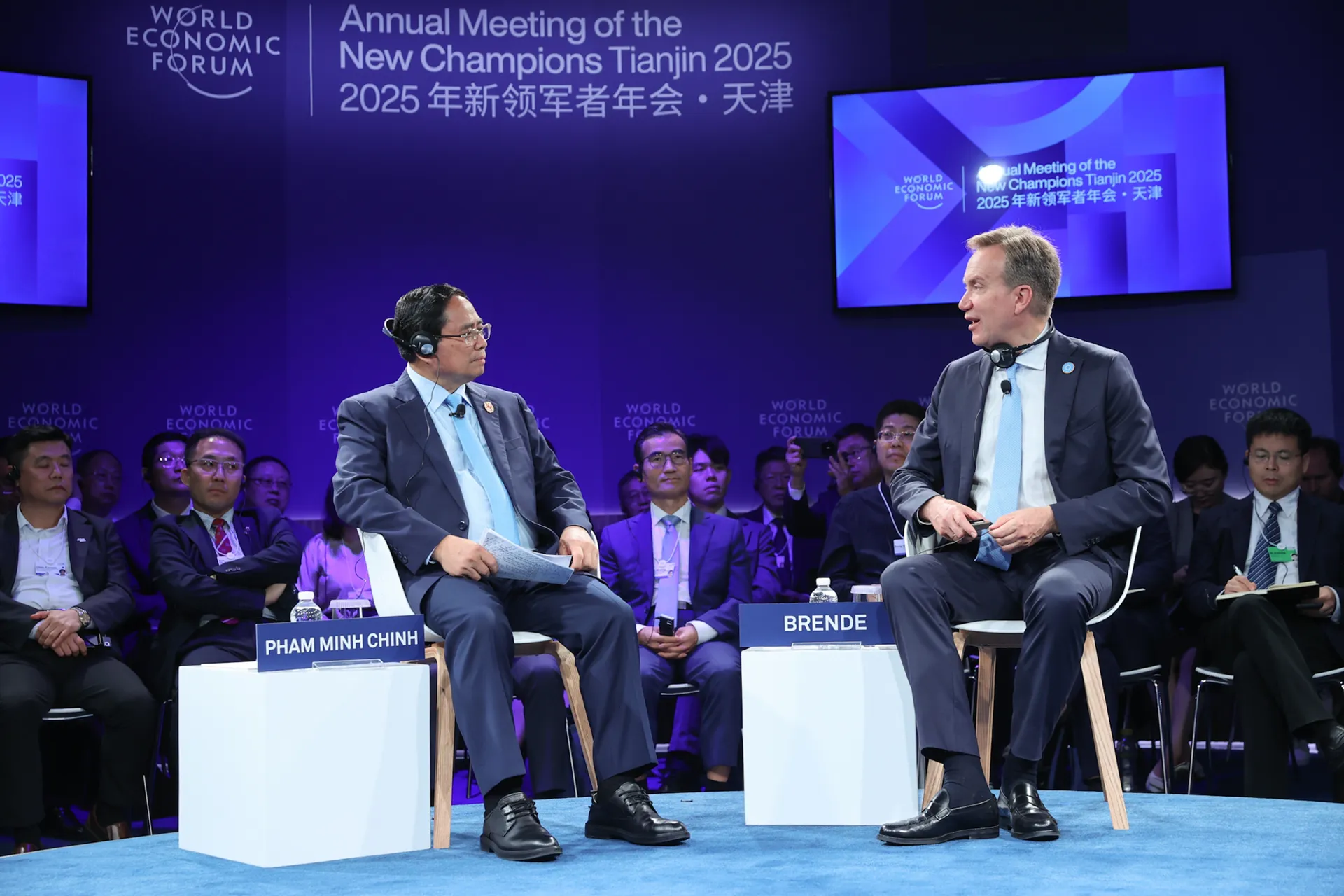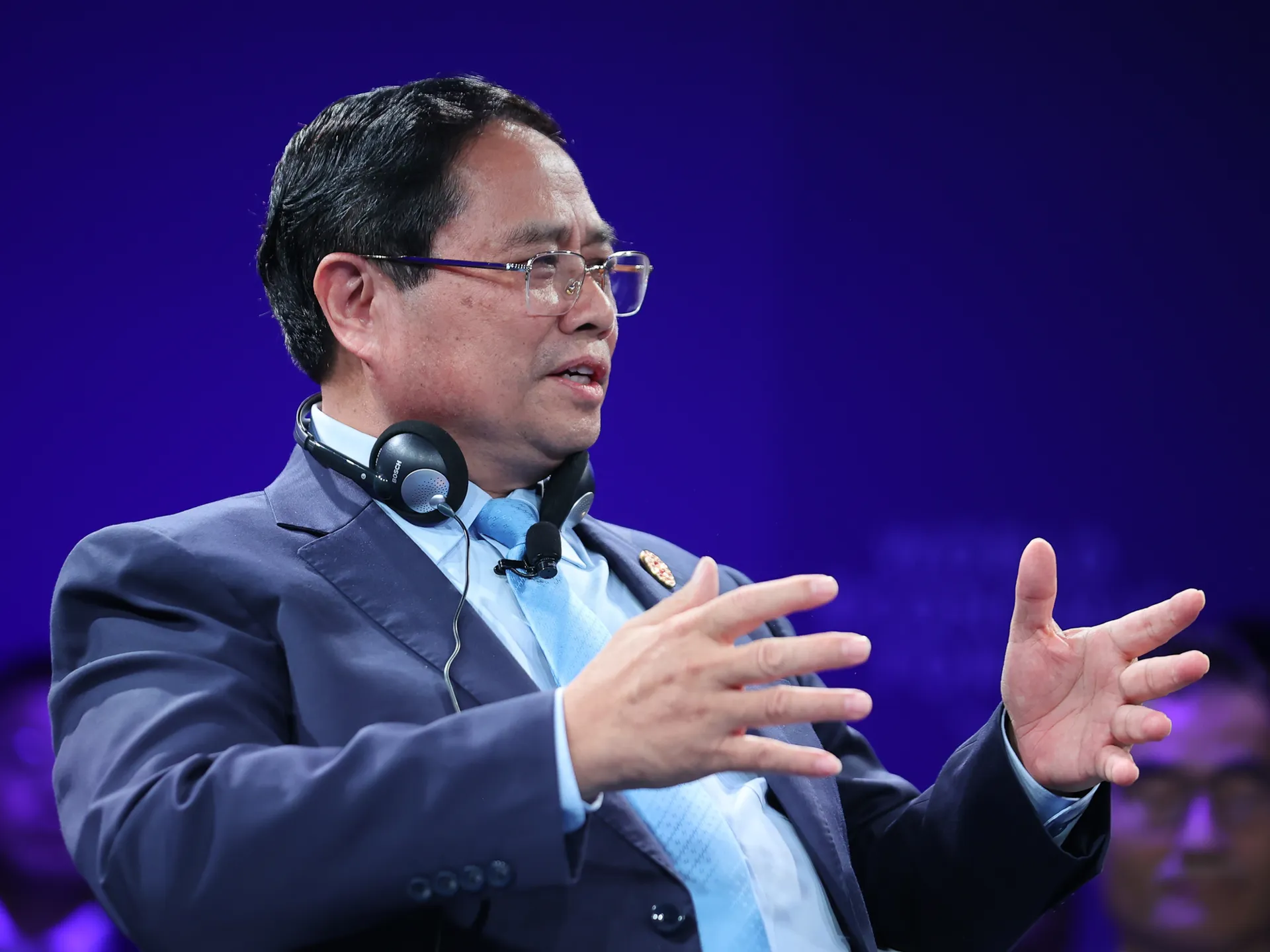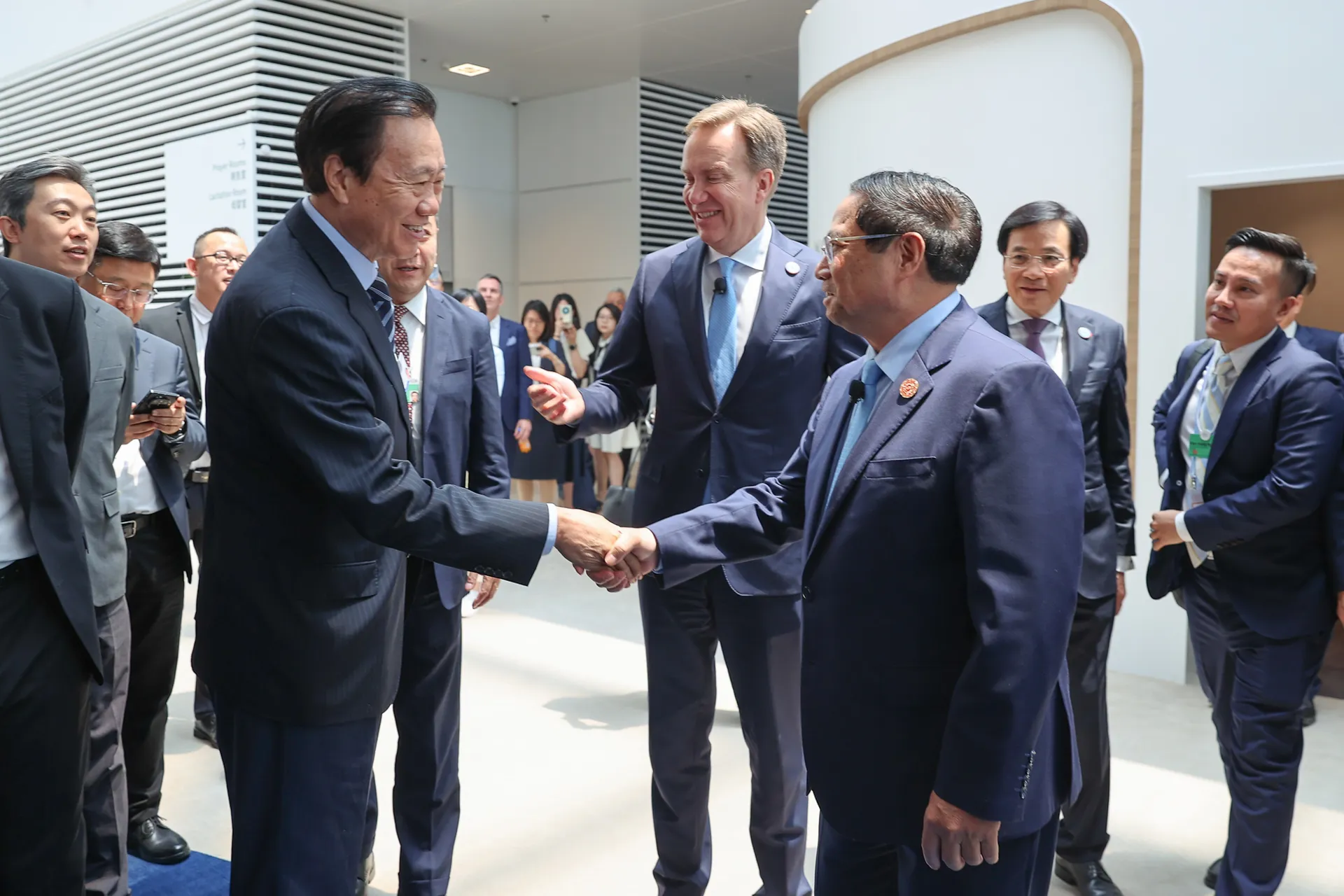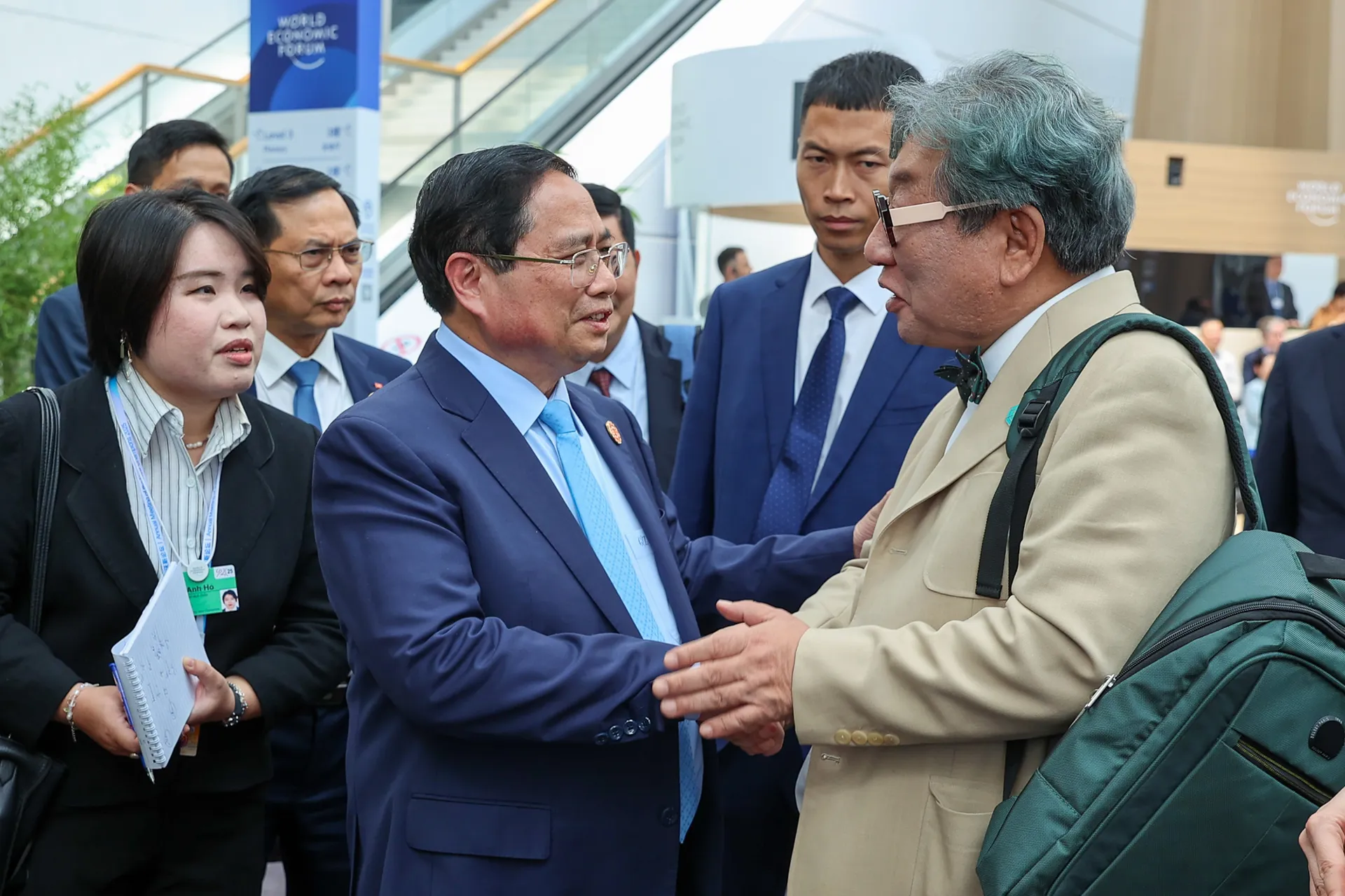Vietnam's approach is confident balancing of principles with courage
Vietnam’s commitment to a balanced approach is believed to contribute to its prosperity and sustainability and those of the region.
Vietnam has delivered a compelling message of confidence, courage, and principle-based governance at a high-level policy dialogue titled “Vietnam’s New Era: From Vision to Action,” chaired by WEF President and CEO Børge Brende.

Vietnam's Prime Minister Pham Minh Chinh (L) and WEF President and CEO Børge Brende at a high-level policy dialogue titled “Vietnam’s New Era: From Vision to Action” in Tianjin on June 25. Photos: VGP
Held within the World Economic Forum (WEF)’s 16th Annual Meeting of the New Champions in Tianjin, China, the event saw Vietnamese Prime Minister Pham Minh Chinh sharing Vietnam’s ambitious vision of becoming a high-income developed nation by 2045, underpinned by a foreign policy of independence, self-reliance, and proactive global integration.
His attendance, which included bilateral meetings with WEF leaders and global counterparts, highlights Vietnam’s rising prominence as a resilient and dynamic player in the global economy.
The policy dialogue, attended by over 100 delegates from governments, organizations, and enterprises worldwide, was a highlight of the WEF Tianjin 2025 conference.
Brende opened the session by stating: “Many guests are still waiting outside because the venue is over capacity.” He went on to praise Vietnam’s economic resilience, highlighting its impressive GDP growth of 7% in 2024 and its ambitious target of 8% for 2025. Despite a forecasted global economic slowdown of 2.5%, Vietnam is projecting double-digit growth thereafter.
“Vietnam is a standout success story for its resilience and relentless growth in a sea of global volatility,” Brende said.
Prime Minister Chinh then outlined Vietnam’s strategic vision, emphasizing a balanced approach rooted in Marxist-Leninist principles and the teachings of Ho Chi Minh, as well as a thousand-year cultural identity adapted to modern realities.
“Vietnam is confident and resolute in maintaining balance based on principles,” he affirmed, stating that internal resources, including political stability, a people-centric government, and citizen empowerment, are the bedrock of growth, while external resources facilitate breakthroughs.
He highlighted Vietnam’s goal of achieving developed nation status by 2045, driven by a socialist-oriented market economy, comprehensive infrastructure development, and innovation in the digital and green economies.
Chinh also addressed Vietnam’s ability to navigate geopolitical complexities, particularly its relationships with major powers like the United States and China, which accounted for nearly 50% of its $800 billion import-export turnover in 2024.

Prime Minister Pham Minh Chinh at the dialogue.
In response to Brende’s question on managing major power competition, Chinh stressed Vietnam’s “four no’s” defense policy: no military alliances, no siding against others, no foreign bases, and no use or threat of force.
“We prefer dialogue over confrontation and cooperation over conflict,” he said, citing Vietnam’s transformation from a war-torn nation to a comprehensive strategic partner with the US as a testament to its principled diplomacy.
Brende exclaimed: “How the US became Vietnam’s top export market just decades after the war is remarkable.”
Thanks to its foreign policy of independence, self-reliance, multilateralism, and diversification positions, the country is a trusted global partner.
Chinh said that Vietnam can remain agile by diversifying its markets, products, and supply chains amid global shifts. “The greater the challenge, the greater the effort required to overcome,” he said. This approach has earned Vietnam recognition as a reliable and responsible member of the international community, fostering cooperation with nations across ASEAN, BRICS, and other regions.

PM Chinh meets friends and guests after the dialogue.
Strategic engagements at WEF Tianjin
In addition to the policy dialogue, Chinh joined and hosted many bilateral meetings and activities at WEF Tianjin. In a bilateral meeting with Brende and Interim WEF Chairman Peter Brabeck-Letmathe, Chinh welcomed the alignment of WEF Tianjin’s themes, “Digital Transformation, Green Economy, and Innovation”, with Vietnam’s priorities.
Brabeck-Letmathe commended Vietnam’s “flexible and effective economic governance” and pledged to accelerate the 2023 Vietnam-WEF Memorandum of Understanding by focusing on practical projects to enhance Vietnam’s collaboration with global enterprises.
The Vietnamese PM also attended the opening plenary alongside leaders like Chinese Premier Li Qiang and Singaporean Prime Minister Lawrence Wong.
In his keynote speech at the “Is the Asian Century at Risk?” session, he emphasized Vietnam’s commitment to regional cooperation and sustainable development.
Vietnamese Ambassador to China Pham Thanh Binh noted that Chinh’s participation marked his third consecutive appearance at WEF Tianjin, describing it as a “rare and commendable gesture,” reflecting Vietnam’s growing influence.

PM Pham Minh Chinh meets experts after the dialogue.
Model of resilience and ambition
The Vietnamese prime minister’s engagements at WEF Tianjin, ranging from policy dialogues to bilateral meetings, showcased Vietnam’s determination to enter a “new era of national rise.”
He outlined plans for transformative infrastructure projects, including a North-South high-speed railway, a railway connecting to China and Central Asia, and a nuclear power plant, all of which are to be implemented within five years.
These major projects, coupled with Vietnam’s focus on digital and green economies, position the country as a leader in ASEAN’s sustainable development.
Deputy Minister of Foreign Affairs Nguyen Minh Hang emphasized that the Tianjin meeting offered Vietnam a platform to “contribute and promote solutions to economic and development issues,” thereby enhancing its global prestige.
PM Chinh affirmed that Vietnam, by maintaining balance based on principles, not only navigates global complexities but also shapes a prosperous and sustainable future for itself and the region.








